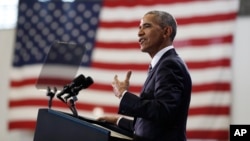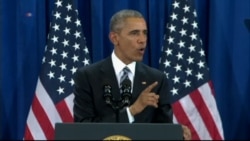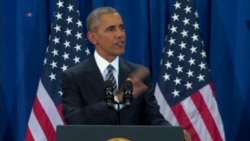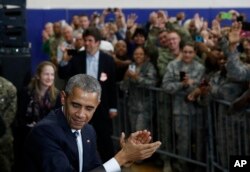President Barack Obama used his final national security speech to offer a defense of his counterterrorism record and lay out what he believes should be guiding principles for the new administration taking over the White House in January.
Speaking to troops Tuesday at MacDill Air Force Base in Tampa, Florida, Obama said, “Over the last eight years, no foreign terrorist organization has successfully planned and executed an attack on our homeland,” adding that it was not for a lack of trying. He told the troops, “This is your work.”
Obama laid out how he views the status of the fight against terror after his two terms, getting loud applause when he said al-Qaida leader Osama bin Laden is dead. He noted with pride that when he took office, 180,000 U.S. troops were deployed in Iraq and Afghanistan, saying that number is now down to 15,000.
WATCH: Obama's presidency during time of war
He said the reduction in U.S. ground forces deployed in war zones marks a deliberate shift in strategy to rely more on building strong international coalitions and relying on local partners, in order to reduce American casualties and monetary costs.
That shift in strategy also includes a drastic increase in the number of drone strikes targeting terrorists during Obama's term. He acknowledged the lack of complete certainty with the strikes and the civilian casualties that have resulted, but said drones are more precise than airstrikes and are less likely to result in the deaths of innocent civilians than troops deployed in a ground invasion.
Obama touted substantial progress against the Islamic State terrorist group, saying, "The bottom line is we are breaking the back of ISIL (Islamic State).” He said the cost was considerably lower than efforts in the previous administration, putting it at $10 billion over two years.
WATCH: Obama on efforts to combat terrorism
But he cautioned that the nature of terrorism makes a clearly defined military victory like those in wars of the past impossible to achieve.
"So rather than offer false promises that we can eliminate terrorism by dropping more bombs, or deploying more and more troops, or fending ourselves off from the rest of the world, we have to take a long view of the terrorist threat, and we have to pursue a smart strategy that can be sustained," he said.
Without mentioning his name, Obama rejected President-elect Donald Trump’s call for a ban on Muslims and his support expressed during the election campaign for waterboarding.
"If we act like this is a war between the United States and Islam, we're not just going to lose more Americans to terrorist attacks, but we'll lose sight of the very principles we claim to defend," Obama said. He added the United States is not a place where some citizens have to prove they are not an enemy.
Obama came to office pledging to shut down the detention facility at Guantanamo Bay, Cuba. Nearly 800 people have been detained there, a number that has dropped to about 60 with a month left in Obama's term.
He said Tuesday it is past time to close the facility, calling it a "blot" on America's honor and a waste of money.
Some critics of the president’s counter-terror strategy, including President-elect Trump, say that by pulling U.S. forces out of Iraq, Obama created a vacuum that terrorists have used to set up a base.
Terrorism expert Max Abrahms of Northeastern University disagrees, saying the “original sin” on Iraq was former President George W. Bush’s decision to depose former Iraqi leader Saddam Hussein. He also faults Obama for “regime change” in Libya. But Abrahms said Obama’s overall record in the fight against terror is “respectable.”
“I think Obama, to his credit, improved at counter-terrorism over time. His initial response to the Islamic State was too tepid. It was too slow. It wasn’t intense enough.”
Abrahms added, “And it was only when our journalist James Foley had his head chopped off, when [Islamic State executioner] 'Jihadi John' bragged about it, that Obama went before the American public and basically rallied support for a more robust counterterrorism mission.”
Abrahms agreed with Obama that one of the biggest issues that remains to be resolved is the problem of “lone wolf” terrorists at home, individuals radicalized online and acting on their own.
Colin Clarke of the RAND Corporation praised Obama’s national security record for his ability to form large international coalitions and his prohibition of torture, saying, “I think they will outlast this presidency and give some momentum to President-elect Trump as he grapples with a very serious set of circumstances. Clarke pointed out that the person Trump chose to be his secretary of defense, retired General James Mattis, recently said waterboarding is not effective.
“Mattis is someone that has spoken out against waterboarding and so we are likely to see him [Trump] taking the wise counsel he is now surrounding himself with and possibly being a bit more deliberative and discerning with respect to some of those positions he has taken.”








